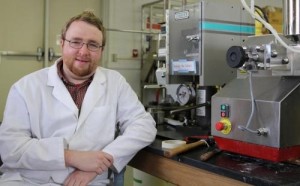
After studying the antibacterial properties of bioplastics, researchers found that albumin looks to be the most promising.
Image: Cal Powell/UGA
Since Leo Baekeland’s invention of Bakelite in 1907, plastic has undergone a lot of transformation. Now, plastic isn’t just used in toys and phones—it also has promising potential in medical applications.
Researchers from the University of Georgia are creating bioplastics from albumin—a protein found in eggs with significant antibacterial properties—to expand plastic’s potential into areas such as wound healing dressing, sutures, catheter tubes, and drug delivery.
“It was found that it had complete inhibition, as in no bacteria would grow on the plastic once applied,” said Alex Jones, a doctoral student at the University of Georgia. “The bacteria wouldn’t be able to live on it.”
The development detailed in this study is critical due the high percentage of hospital-acquired infections.
This from University of Georgia:
Researchers are encouraged by the antimicrobial properties of albumin-based bioplastics that could potentially reduce these risks through drug elution—loading the bioplastic with either drugs or food preservatives that can kill bacteria or prevent it from spreading.
The protein aspect of the plastic also makes the material environmentally friendly. The proteins in the material will break it down in a landfill and will allow it to disintegrate in soil in a short period of time.
The study was published in the Journal of Applied Polymer Science.

